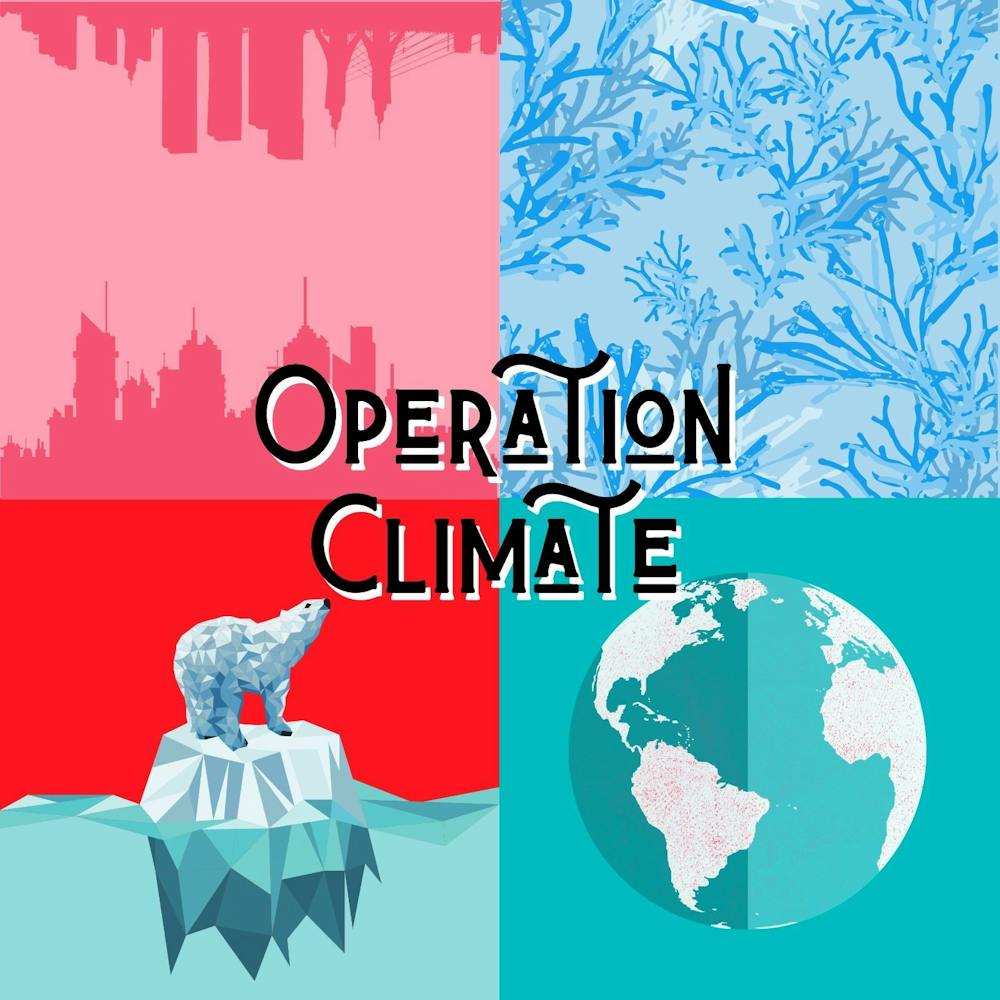With their newest podcast episode, “Combating Climate Misinformation: Say It With Science”, the Duke students at the helm of nonprofit Operation Climate have teamed up with the United Nations to tackle the abundance of misinformation surrounding climate change.
“Operation Climate is a climate education and storytelling project,” said Duke senior Katherine Li, one of the organization’s co-founders who currently serves as director of internal operations and executive producer. “We wanted to provide an easily digestible, accessible to the public way of getting people to learn about climate issues — and storytelling is a really great way to do that.”
It started in early 2020 as a research project for the Bass Connections project team DECIPHER, where Li and her group members created a podcast miniseries on the history and impact of geoengineering. In the year and a half since, Operation Climate, which recently gained 501(c)(3) nonprofit status, has expanded far beyond its roots. Its podcast has broadened in scope to cover all aspects of the climate crisis, and just wrapped up its fourth season; the organization also engages with the Duke community through a partnership with Duke Environmental Alliance, speaks at climate events in the Durham area, and runs a climate communication internship program for high school students.
Li and her team wanted to create an episode to highlight the start of COP26, the 2021 United Nations Climate Change Conference, held in Glasgow from Oct. 31 to Nov. 12. COP26 marked the first significant test of the 2015 Paris Climate Agreement, requiring all countries to give their first update on their nationally determined contributions towards opposing climate change, and it provoked heated debate in the news and on social media.
“There are a lot of climate discussions going on in the world right now,” Li said, and Operation Climate aimed to give people the tools “to understand what’s happening and spark conversations on climate” in their everyday lives. According to Li, “having climate change conversations is one of the easiest things people can do to fight the climate crisis, because it doesn’t have many barriers to entry. And so a very important skill to learn, in order to be able to do that, is [to ask]: ‘How do I actually refute climate deniers? Do I actually speak to them at all? Where would my energy be best spent in having these conversations?’”
As Operation Climate searched for the best way to address COP26, Duke’s Innovating for Social Impact class reached out. The course, taught by Visiting Professor Danielle Zapotoczny (who also serves as the United Nations Foundation’s Senior Director of Partnerships & Communications), gives its students the opportunity to collaborate with real-world organizations that use public-private partnerships to solve social issues. Much of their work for the fall 2021 semester had been with the UN Foundation’s Say it with Science Initiative — a movement to help young people participate in climate activism and debunk misinformation in their communities. The students’ goal was to “find new, innovative ways to get climate change to the top of everyone's minds,” and they saw Operation Climate as a great platform to spread the UN’s message.
Through Innovating for Social Impact, Operation Climate connected with Devin Domeyer, a climate scientist and Community Management Consultant at the United Nations (and a current graduate student at Duke’s Nicholas School of the Environment). Together, they created the podcast episode “Combating Climate Misinformation: Say It With Science”, which premiered Nov. 1. In the episode, Domeyer breaks down how climate conversations are changing in the wake of COP26; she goes on to outline a variety of techniques that listeners can use to start constructive dialogues about climate change in any situation, from academic spaces to family dinners.
“It was interesting to hear [Domeyer’s] perspective on tips and tricks to talk about climate change,” said Li, who hosted the episode. “She brought up the point that you don’t have the responsibility to talk about climate change. That there are people who it might not be productive to talk to, like climate deniers and climate agnostics, and that your energy may be better spent elsewhere. I also really like that she got into the issue of climate anxiety that a lot of young people are facing today, and how we actually talk about climate change if it has such huge emotional undertones.”
Future plans for Operation Climate include two miniseries — one exploring the conservation of different ecosystems around the world, the other investigating fossil fuel investment on college campuses — and a “DIY episode” explaining how to join the fossil fuel divestment movement at Duke. Li stresses that no prior experience is necessary to get started with climate activism on campus.
“Anyone can be a climate activist. You don’t have to know a lot about environmental science, or have taken a class, or join a club,” she said. “The first step is to educate yourself, to figure out where exactly you fit into the movement. And everyone has different skills that they can offer. For example, if someone’s great at art and graphic design, so many climate organizations need artists and graphic designers to amplify their messages. If you’re really good at having a loud voice, go to protests: you can be such a huge asset there. So, figuring out what your skills are and where you fit in, trying to find like-minded people and learning from them — that’s a great way to start.”
Correction: This article has been updated to reflect the correct spelling of Devin Domeyer. The Chronicle regrets the error.
Get The Chronicle straight to your inbox
Signup for our weekly newsletter. Cancel at any time.

